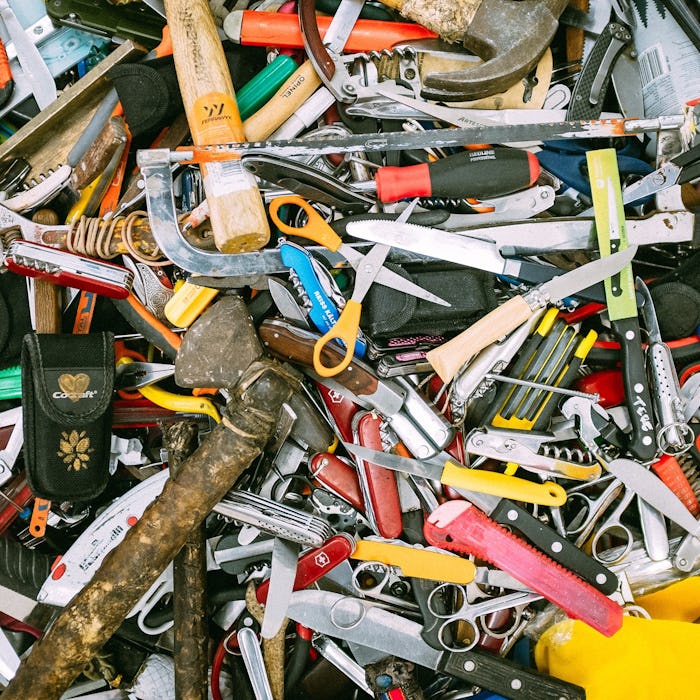Sure, hoarding makes an interesting premise for a sensationalized TV show, but it's important to remember that the condition does affect real people every day. Even if your entire home isn't buried under an avalanche of stuff, you may want to be on the lookout for subtle signs you're a hoarder.
Granted, the more low-key cases of hoarding may not be as shocking as their televised counterparts, but any hoarding tendencies can affect your quality of life. As noted by the Mayo Clinic, a hoarding disorder is characterized by difficulty in parting with possessions. Although everyone has a few sentimental items they'd prefer to keep on hand, persons with hoarding behavior may hang on to all sorts of items without any regard for their actual value, as further noted by the Mayo Clinic.
Additionally, there's a difference between having a lived-in house and displaying hoarding tendencies. Letting the mail pile up for a week or two because you're particularly busy is not the same as holding on to junk mail for months because you can't bear to part with it. Overall, it's a good idea to familiarize yourself with the signs of hoarding in case you or a loved one displays these behaviors. If any of these signs hit a little too close to home, then reaching out to a doctor or counselor for help may be a great first step.
1
You Can't Use Some Parts Of Your Home
For some persons with hoarding tendencies, the collection of stuff starts taking over usable parts of the home. As noted on The Huffington Post, it's common for tables, chairs, or an entire room to be so piled with stuff that it becomes unusable. The house may be overall inhabitable, but noticeably choked with things.
2
You Stock Up On Useless Things
For some people with a hoarding disorder, even items of little to no apparent value are collected. Things such as napkins or restaurant trash may be kept around, as noted by the Mayo Clinic. If you're compelled to save things that are objectively pretty useless, then it may be reason to take note.
3
You See Cleaning As An Insurmountable Chore
Part of the problem with hoarding is that the clutter perpetuates other problems. For instance, you may feel exceptionally challenged when trying to clean a hoarding home, as noted by the Cleveland Clinic, because the stuff can make vacuuming or other basic tasks difficult. This, in turn, can aggravate allergies or asthma symptoms.
4
You Lose Things. . . A Lot
When a house or workspace is being overtaken by stuff, organization is almost impossible to maintain. According to the International OCD Foundation, important things, such as cash or bills, may routinely get lost in the clutter of a hoarding home. In this case, the stuff is directly affecting your basic ability to function.
5
You Buy Sale Items Just Because
Granted, everyone likes a good deal. But if you're buying things just because they're on sale, even if you don't really need them, then it may be a sign of hoarding behavior, as noted by the International OCD Foundation. Sometimes those bargains just become clutter.
6
You Save Things For Future Use
Not all objects count as an investment. For instance, many persons who struggle with hoarding may feel compelled to save things because they might be useful someday, according to WebMD. When that day will come, and what that use will be, however, remains undetermined. This was probably a good strategy in the Great Depression, but in the current world it often results in an overabundance of stuff.
7
You're In Distress About The Stuff
For many people with hoarding tendencies, their desire to collect more things, and the current state of their living space, can result in some serious negative feelings. As an example, many persons who display hoarding behaviors may feel distressed by the stuff and its affect on their lives, as noted by the American Psychiatric Association. Other people, however, may exhibit symptoms of denial about the severity of their hoarding problem.
8
You Worry About Throwing Out The Wrong Thing
Many hoarders amass clutter in an attempt to avoid mistakes. According to Psych Central, many people prone to hoarding are afraid of accidentally throwing out the wrong thing, so they just hold on to more or less everything to prevent any accidents.
9
You Have An Extreme Attachment To Items
Although the stuff may look chaotic to outsiders, persons with hoarding symptoms often feel protective of their belongings. As noted by the NHS, someone with a hoarding disorder might become so attached to their things that they will not let anyone else borrow or even touch them. This could further cause tensions with friends and family.
